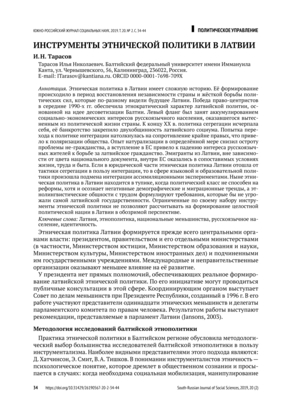Abstract
Ethnic policy in Latvia has a complicated history. It was shaping itself during the restoration period of Latvia’s independence and through fierce struggle of political forces that understood the country’s future in radically different ways. The victory of the center-right politicians in the middle of the 1990s secured the ethnocratic nature of Latvian policy that was based on de-sovietization of the Baltics. The leftists were busy accumulating social and economic interests of the Russian-speaking population that was excluded from political life. It became clear that by the end of the XX century the policy of segregation had failed ipso facto securing the bi-community of Latvian society. The attempt to move on to the policy of integration met with the opposition of the ultra-rights, thus causing the polarization of the society. Attempt at naturalization has brought down the acuity of the problem of non-citizenship to some extent; at the same time, EU accession resulted in the fall of the Russian-speaking population interest in their fight for Latvian citizenship. Immigrants from Latvia, irrespective of the color of their passport, found themselves in the comparable living and working conditions inside the EU. It is important to emphasize that while in its legal part the ethnic policy of Latvia moved away from segregation tactics in favor of integration, there occurred the substitution of integration for experiments in assimilation in language and educational policy. The ethnic policy of Latvia reached a deadlock, now that the politicians are not able to carry out reforms, even though they are aware of negative demographic and migration trends, while ethno-linguistic communities can hardly formulate the requirements to avoid threatening the statehood of Latvia.
Keywords
References
- Bleiere, D. (Ed.). (2005). Istoriia Latvii. XX vek [The History of Latvia. XX century]. Riga: Iumava.
- Volkov, V. V. (2013). Demografiia russkogo naseleniia Latvii v XX–XXI vekakh [Demography of Latvia’s Russian Population in the XX–XXI centuries]. In V. V. Poleshchuk, V. V. Stepanov (Eds.) Etnicheskaia politika v stranakh Baltii [Ethnic Policy in the Baltic Countries]. M.: Nauka.
- Gribanova, G. I., Kosov, Yu. V. (2018). Politika NATO na Baltike – tseli i prioritety [NATO Policies in the Baltics: Objectives and Priorities]. Baltiiskii region [Baltic Region], 10(1), 56–72.
- Zatulin, K. F. (Ed.). (2014). Sravnitel’nyi analiz pravovogo polozheniia sootechestvennikov, prozhivaiushchikh v postsovetskikh stranakh [Comparative Analysis of the Legal Status of Compatriots in Post-Soviet Countries]. M.: Institut diaspory i integratsii (Institut stran SNG).
- Lanko, D. A., Tarasov, I. N., Shvets, Ya. V. (2016). Aktivnost’ agentov “myagkoi sily” Germanii v Estonii: analiz organizatsionnyh faktorov [The Active Agents of Soft Power of Germany in Estonia: Analysis of Organizational Factors]. Vlast’ [The Power], 24(12), 223–231.
- Olenchenko, V. A., Mezhevich, N. M. (2018). Pribaltiiskie issledovaniya v 2017 godu [Baltic Studies in 2017]. Vestnik Baltiiskogo federal’nogo universiteta im. I. Kanta [IKBFU’s Vestnik], 3, 5-13.
- Smirnov, V. A. (2016). Vneshnyaya politika stran Pribaltiki v otnoshenii Rossii [The Role of the Baltic States in the Policy of EU Sanctions against Russia: Theoretical Aspects]. Sovremennaya Evropa [Contemporary Europe], 21(5), 56-61.
- Tarasov, I. N. (2008). Konstruirovanie novoi “Vostochnoi politiki” Evropeiskogo soyuza [Constructing a new “Eastern Policy” of the European Union]. Politiya [Politeia], 2, 18-30.
- Tishkov, V. A. (2003). Rekviem po etnosu: Issledovaniia po sotsial’no-kul’turnoi antropologii [Requiem for Ethnos: Research on Socio-Cultural Anthropology]. M.: Nauka.
- Baltruka, S., Indāns, I., Krūma, K. (2009). Enacting Non-citizenship in Latvia: Challenges to National and European Frameworks. Brussels: ENACT Consortium.
- Citizenship Law (2015). Retrieved from http://www.vvc.gov.lv/export/sites/default/docs/LRTA/Likumi/Citizenship_Law.doc
- gada 18. februāra tautas nobalsošana par likumprojekta “Grozījumi Latvijas Republikas Satversmē” pieņemšanu Rezultāti (2012). CVK. Retrieved from http://www.tn2012.cvk.lv/report-results.html
- Esman, M. (1994). Ethnic politics. Retrieved from http://www.questia.com/read/103734301/ethnic-politics
- Hutchinson, J. (2009). Warfare and the Sacralisation of Nations: The Meanings, Rituals and Politics of National Remembrance. Millennium Journal of International Studies, 38(2), 401–417. DOI: https://doi.org/10.1177/0305829809347538
- Jansons, A. (2003). Ethnopolitics in Latvia: Ethnopolitical Activities of State Institutions and Non-governmental Organisations and their Influence on the Social Integration Process. Ethnicity Studies, 1, 124–133.
- Kamusella, T. (2001). Language as an instrument of national-ism in Central Europe. Nations and nationalism, 7(2), 235–251.
- King, V. O. (2012). Latvia’s Unique Path toward Independence: The Challenges Associated with the Transition from a Soviet Republic to an Independent State. International Social Science Review, 87(3/4), 127–154.
- Malmlöf, T. (2006). The Russian Populations of Latvia — Puppets of Moscow? Stockholm: FOI — Swedish Defence Research Agency.
- Mellor, R. (1989). Nation, State, and Territory: A Political Geography. London: Routledge.
- Muižnieks, N. (Ed.) (2006). Russian Foreign Policy towards „Compatriots” in Latvia. Latvian-Russian Relations. Domestic and International Dimensions. Riga: LU Akadēmiskais apgāds.
- Priedīte, A. (2005). Surveying Language Attitudes and Practices in Latvia. Journal of Multilingual and Multicultural Development, 5, 409–424.
- Schopflin, G. (1995). Nationalism and Ethnicity in Europe, East and West. Nationalism and Nationalities in the New Europe. NY: Cornell University Press.
- Smith, A. D. (2009). Ethno-symbolism and Nationalism: A Cultural Approach. NY: Routledge.
- Smooha, S. (2001). The Model of Ethnic Democracy. ECMI Working Paper # 13. Retrieved from https://pdfs.semanticscholar.org/8e61/c03955b467b6946ffc56f4453b014b150aa8.pdf
- Zelče, V. (2009). History — Responsibility — Memory: Latvia’s Case. In J. Rozenvalds, I. Ijabs (Eds.) Latvia Human Development Report 2008/2009. Accountability and Responsibility. Riga: Advanced Social and Political Research Institute.
 Русский
Русский


